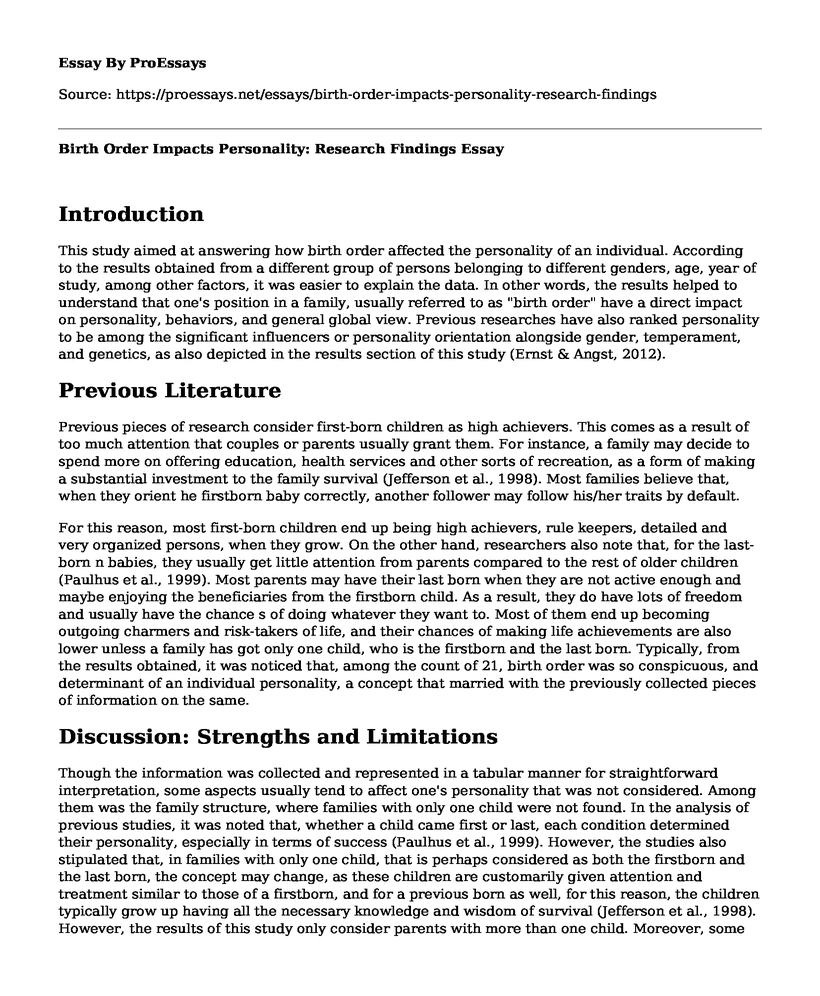Introduction
This study aimed at answering how birth order affected the personality of an individual. According to the results obtained from a different group of persons belonging to different genders, age, year of study, among other factors, it was easier to explain the data. In other words, the results helped to understand that one's position in a family, usually referred to as "birth order" have a direct impact on personality, behaviors, and general global view. Previous researches have also ranked personality to be among the significant influencers or personality orientation alongside gender, temperament, and genetics, as also depicted in the results section of this study (Ernst & Angst, 2012).
Previous Literature
Previous pieces of research consider first-born children as high achievers. This comes as a result of too much attention that couples or parents usually grant them. For instance, a family may decide to spend more on offering education, health services and other sorts of recreation, as a form of making a substantial investment to the family survival (Jefferson et al., 1998). Most families believe that, when they orient he firstborn baby correctly, another follower may follow his/her traits by default.
For this reason, most first-born children end up being high achievers, rule keepers, detailed and very organized persons, when they grow. On the other hand, researchers also note that, for the last-born n babies, they usually get little attention from parents compared to the rest of older children (Paulhus et al., 1999). Most parents may have their last born when they are not active enough and maybe enjoying the beneficiaries from the firstborn child. As a result, they do have lots of freedom and usually have the chance s of doing whatever they want to. Most of them end up becoming outgoing charmers and risk-takers of life, and their chances of making life achievements are also lower unless a family has got only one child, who is the firstborn and the last born. Typically, from the results obtained, it was noticed that, among the count of 21, birth order was so conspicuous, and determinant of an individual personality, a concept that married with the previously collected pieces of information on the same.
Discussion: Strengths and Limitations
Though the information was collected and represented in a tabular manner for straightforward interpretation, some aspects usually tend to affect one's personality that was not considered. Among them was the family structure, where families with only one child were not found. In the analysis of previous studies, it was noted that, whether a child came first or last, each condition determined their personality, especially in terms of success (Paulhus et al., 1999). However, the studies also stipulated that, in families with only one child, that is perhaps considered as both the firstborn and the last born, the concept may change, as these children are customarily given attention and treatment similar to those of a firstborn, and for a previous born as well, for this reason, the children typically grow up having all the necessary knowledge and wisdom of survival (Jefferson et al., 1998). However, the results of this study only consider parents with more than one child. Moreover, some of the family factors like favoring a child over the other are not found. One major strength of this research is that the information obtained in the results can be transformed by learners, to generate new solutions and strategies of solving the problem that may be present in the whole process like favoritism.
Discussion: Future Research
The results obtained in this study were very insightful and gave a broad view to professional intellectuals and learners on how birth order related to the theme of personality. Although, with the highlighted weaknesses, there is a need to perform more advanced research that incorporates all of the excluded aspects of considerations. For instance, Thomas, in his article named "Does living with step- or half-siblings make children more aggressive? States that by adding a step-sibling or sometimes half-siblings into families due to factors such as divorce and or remarriage, also have got a significant impact on determining a child's personality (Thomas, 2016). Future studies should then look at all of this concern to give a wide and a comprehensive view of the same.
References
Ernst, C., & Angst, J. (2012). Birth order: Its influence on personality. Springer Science & Business Media. Retrieved from https://books.google.com/books?hl=en&lr=&id=SQwyBwAAQBAJ&oi=fnd&pg=PT24&dq=%22birth+order%22++and+personality&ots=0ojxpfSxvr&sig=mHR71z3oRrLA2OVxF75mbMT_ccw
Jefferson, Jr, T., Herbst, J. H., & McCrae, R. R. (1998). Associations between birth order and personality traits: Evidence from self-reports and observer ratings. Journal of Research in Personality, 32(4), 498-509. Retrieved from https://www.sciencedirect.com/science/article/pii/S0092656698922334
Paulhus, D. L., Trapnell, P. D., & Chen, D. (1999). Birth order effects on personality and achievement within families. Psychological Science, 10(6), 482-488. Retrieved from https://journals.sagepub.com/doi/abs/10.1111/1467-9280.00193
Thomas, S. S. (2016, April 2). Does Living with Step- or Half-Siblings Make Children More Aggressive? Retrieved from https://www.vice.com/en_uk/article/nn9pew/does-Living-with-a-step-or-half-sibling-make-children-more-aggressive
Cite this page
Birth Order Impacts Personality: Research Findings. (2023, Jan 27). Retrieved from https://proessays.net/essays/birth-order-impacts-personality-research-findings
If you are the original author of this essay and no longer wish to have it published on the ProEssays website, please click below to request its removal:
- Essay Sample on Self-Management and Mindfulness
- Research Paper on Should 'Mental Harassment' in a Conjugal Relationship Be a Criminal Offense?
- Essay Sample on Clinical Study of Mental Ilnesses
- Essay Sample on Internet Addiction as a Medical Condition
- Essay Sample on Personality: Traits and Situation Interplay
- Depression in Children: Types, Symptoms and Treatment - Research Paper
- Essay Example on The Power of Pets: Benefits of Keeping Dogs & Cats in Modern Times







